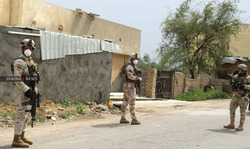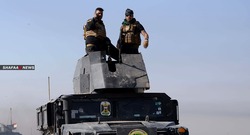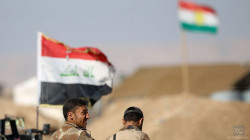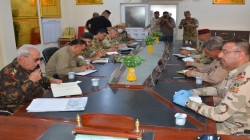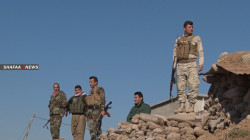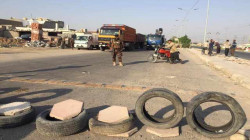Fires of "Greed" and "Vandalism" vanquish Diyala's orchards
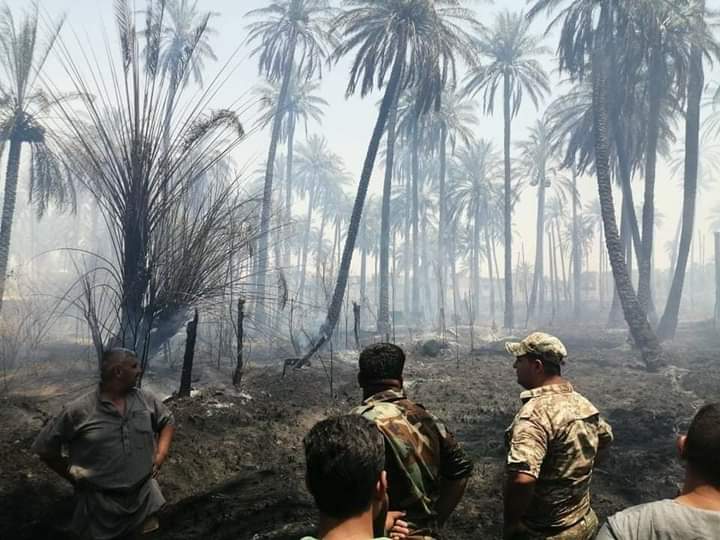
Shafaq News / While civil defense hoses pump water to put out a fire that broke out in an orchard on the outskirts of Baquba, the center of Diyala, some question the reasons for the increase in fire incidents in various administrative units in the governorate.
This summer recorded the highest fire rates in Diyala orchards, turning tens of thousands of dunums into ash and leaving them dilapidated by drought and lack of government support.
Abu Mohammed, a 56-year-old resident of the Dor al-Bawiya area in the outskirts of Baquba, said that some farmers were forced to burn their orchards to get financial compensation after they were destroyed by drought and government neglect, "The orchards burned during the past periods cannot be rehabilitated due to the damage caused by the lack of water, the end of the fruit trees' lives in most administrative units, and the absence of plans to support the horticulture sector and keep pace with agricultural updates to produce fruit trees that resist harsh environmental conditions."
As a result of the deteriorating living conditions and the ongoing financial crises, some of the orchards' owners decided to bulldoze their orchards to turn them into residential land sold with huge money, despite government decisions against bulldozing agricultural land. However, the owners rebelled against these decisions with arson.
Circumventing the law
Against the backdrop of arson and farmers' ambitions, Baquba's district administrator, Abdullah al-Hayali, pointed to the existence of a "circumvention" of strict laws preventing bulldozing lands with heinous means such as burning citrus and palm trees for a handful of money.
Al-Hayali continued, "The imported vegetables and fruits, the decline in local production, the housing crisis, and the high prices of real estate in Baquba, have led the owners of these lands to burn them, bulldoze them, and sell them after a while as residential land."
"Agricultural neighborhoods have become the target of acquiring a land to build a house by low-income people who do not have the financial capacity to buy a few meters of residential land because of the outrageous price hikes," he added, clarifying, "The government's recommendations focused on the need to implement cabinet resolution 71, take punitive measures, hold abusers accountable for orchards and perennial trees, and prevent the expansion of the bulldozing phenomenon in the future."
He stressed the need to, "Impose customs on crops imported from neighboring countries to encourage local product, as well as to give the heads of administrative units the power to implement the resolution of the dissolved Revolutionary Command Council numbered 634 of 1981, which provides for the confiscation of these orchards by the state."
Al-Hayali also called for concerted efforts by agricultural and security agencies to stop bulldozing operations, warning of, "The expansion of the phenomenon of bulldozing orchards and their conversion into residential land in light of the housing crisis across the governorate, which threatens the plant wealth and leads to increased indiscriminate construction."
Destruction of vegetation
The media director of Diyala's agriculture directorate, Mohammed Al-Mandalawi, said that many of the orchard fires were "deliberate" to turn them into residential land.
"Iraqi laws are strict against anyone who burns or bulldozes agricultural land. However, in most of these incidents, the real culprit can not be identified, and it is usually claimed to happen due to high temperatures or electrical contact," Al-Mandalawi continued.
According to official environmental statistics, 30% of vegetation has been destroyed in the past ten years due to several factors, most notably drought, security, fires, agricultural pests, as well as the widespread bulldozing of orchards to sell them as residential or commercial land, especially near major city centers.
Personal retaliations and climatic conditions
Hatem Abd al-Tamimi, Muqdadiyah district administrator, did not agree with the hypothesis that orchards were deliberately burned into residential areas, noting that deliberate bulldozing is confined to land near city centers and administrative units because of the high prices of residential real estate and the large financial returns.
Al-Tamimi told Shafaq News agency that the causes of the fires were "the decaying of orchards, neglect, growing bushes, weather conditions, or possibly deliberate or unintentional operations," pointing, "Terrorists are behind the fire incidents in the volatile regions and villages of Diyala."
"Personal retaliations and conflicts may be causes of fires in villages and remote areas. Also, terrorist groups may be burning orchards for retaliatory reasons," he said.
Despite all the mentioned, security and government investigations into the fires are absent, and all incidents have been recorded as accidental or by an anonymous actor.
